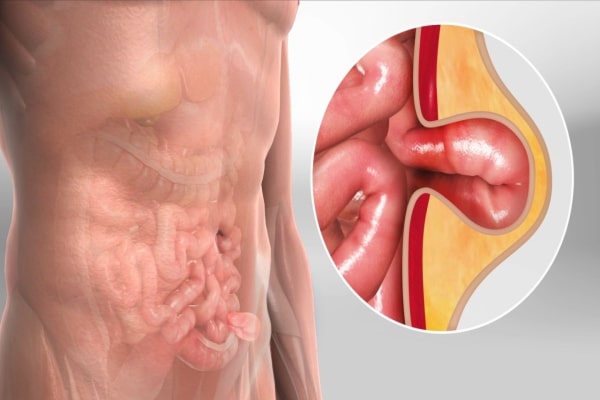A complex abdominal hernia is difficult to repair because of large defects caused by past surgeries or complications, such as small bowel obstruction, infection, or if the intestine is trapped or choked. A complex hernia could also occur when another organ, such as the appendix, ovaries, or spleen, enters the abdominal wall. If a large proportion of the abdominal contents lie inside the hernia, these cases are also classified as complex hernias.

A complex hernia may be caused by:
- Aging
- Anemia (lack of healthy red blood cells)
- Cancer
- Chronic obstructive pulmonary disease (COPD)
- Congenital disability
- Excessive abdominal pressure after surgery
- Excessive corticosteroid use
- Multiple hernia surgeries
- Obesity
- Poor hernia repair, recurrent hernias
- Smoking
- Thinning or weakening of the previous surgical area
- Wound infection
Types of complex hernias and related complications:
- Abdominal wall hernias
- Femoral hernia
- Flank hernias
- Post-transplant hernias
- Hiatal hernias
- Incisional hernias
- Inguinal hernia
- Inguinal pain
- Internal hernias
- Loss of domain hernias
- Mesh complications (pain, infection, erosion)
- Obturator hernias
- Paraduodenal hernias
- Parastomal hernia
- Post-traumatic hernias
- Recurrent hernias
- Special pediatric hernias
- Spigelian hernias
- Thoracoabdominal hernia
- Ventral hernias
Symptoms, Diagnosis, and Outlook
Symptoms of a complex abdominal hernia include:
- Abdominal bulge
- Abdominal pain
- Constipation
- Previous abdominal surgery or hernia repair
- Redness, pain, or hardness of the hernia
- Vomiting
To diagnose an abdominal hernia, we may perform the following tests:
- Ultrasound – a sound wave imaging device is placed on the stomach to look at the structure of your abdomen and pelvic organs
- Computerized tomography (CT) – after you drink a contrasting liquid, a radiologist looks at the structure of your abdomen and pelvic organs in a CT scanner
- Magnetic resonance imaging (MRI) – a radiologist uses an MRI scan to detect any small tears in the abdominal muscles
Our Doctor Sumit Talwar has decades of experience with complex hernias. Our comprehensive preoperative program is designed to reduce the risk of hernia recurrence and other postoperative complications like infection. We will work with you and your primary care physician before surgery to help you with smoking cessation, weight loss, or other chronic health issues that may make the success of a hernia surgery difficult. We aim to help you recover quickly and improve your quality of life.


